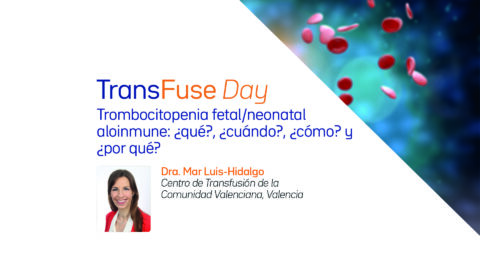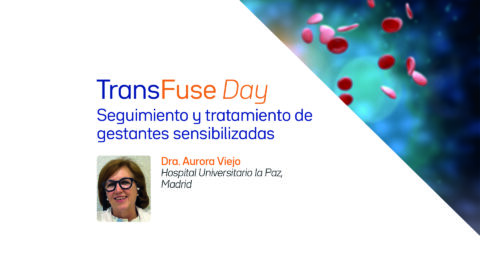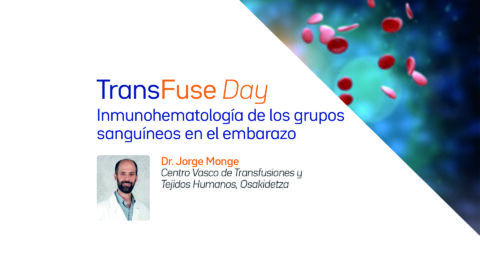

Electronic certificates are available immediately after course completion.
Transfusion
Trombocitopenia fetal/neonatal aloinmune: ¿qué?, ¿cuándo?,¿cómo? y ¿por qué?
Webinar Objectives:
- Trombocitopenia fetal/neonatal aloinmune: ¿qué?, ¿cuándo?,¿cómo? y ¿por qué?
Speakers: MARÍA DEL MAR LUIS // Centro de Transfusión de la Comunidad Valenciana. Responsable del laboratorio de Inmunología Leucoplaquetar y corresponsable del laboratorio de Inmunohematología de la serie roja - Spain
- Spanish
- 52 minutes

Transfusion
Seguimiento y tratamiento de gestantes sensibilizadas
Webinar Objectives:
- Seguimiento y tratamiento de gestantes sensibilizadas
Speakers: Aurora Viejo // Hospital Universitario La Paz. Jefe de Sección de Hematología-Hemoterapia - Spain
- Spanish
- 53 minutes

Transfusion
Inmunohematología de los grupos sanguíneos en el embarazo
Webinar Objectives:
- Inmunohematología de los grupos sanguíneos en el embarazo
Speakers: JORGE MONGE, Responsable del Laboratorio de Inmunohematología. Centro Vasco de Transfusión y Tejidos Humanos (Osakidetza) - Spain
- Spanish
- 50 minutes

Transfusion
Anti-e: autoantibody or alloantibody; concerning or benign?
Target:
- The management of anti-e antibodies in patients with sickle cell disease is discussed, focusing on their classification as autoantibodies or alloantibodies and on the transfusion implications, highlighting the need to combine serology, molecular genetics and personalized transfusion strategies to improve safety and efficacy in these patients.
SpeakerLynsi Rahorst, MHPE, MLS(ASCP)SBBCM
- California, Florida
- Spanish
- 38 minutes

Transfusion
A look at Latin America's journey in voluntary blood donation.
Objective:
- It analyzes the progress and challenges of voluntary blood donation in Latin America, highlighting the evolution of voluntary donation (VD), and emphasizes the importance of collaboration between governments, health services and communities to move towards sustainable and equitable donation systems.
Speaker: Marcela García-Castro
- California, Florida
- Spanish
- 38 minutes

Transfusion
Identifying antibodies, beyond a panel.
Objective:
- The procedures and tools used in the identification of irregular antibodies in immunohematology, an essential process to ensure safe and effective transfusions, are described. The comprehensive approach combines traditional techniques with advanced technologies to identify irregular antibodies and improve transfusion safety.
Speaker: Rocío Castillo Trigueros
- California, Florida
- Spanish
- 37 minutes

Transfusion
The ABO group as a population marker in Latin America.
Objective:
- The ABO blood group is described as a population marker in Latin America, exploring its genetic, historical and evolutionary importance.
Speaker: Dr. Héctor A. Baptista González
- California, Florida
- Spanish
- 33 minutes

Transfusion
Interference of Monoclonal Antibody Treatments in Immunohematologic Studies.
Objective:
- We analyze the interferences caused by treatments with monoclonal antibodies (MABs) in immunohematology studies, focusing on two specific therapies: anti-CD38 and anti-CD47. MAB therapies represent significant advances in oncology and pose technical challenges in immunohematology that can be addressed by specialized strategies.
Speaker: Fernando Martinez, MD, MScPH
- California, Florida
- Spanish
- 31 minutes

Transfusion
Importance of Natural Antibody Titration in Universal Donors.
Objective:
- The importance of ABO antibody titer in universal donors is discussed, especially in the context of platelet transfusions by apheresis.
- The risks associated with transfusion of plasma hemocomponents with high titers of anti-A and anti-B antibodies, such as hemolytic transfusion reactions, especially in vulnerable patients, are highlighted.
- The need to improve hemovigilance and transfusion protocols to ensure patient safety is emphasized.
Speaker: Lissett Aguilar Ocaña
- California, Florida
- Spanish
- 31 minutes

Transfusion
Knowing the Blood Groups Present in the Population We Serve Impacts the Safety of Our Patients.
Objective:
- The importance of knowing the blood groups present in the populations served to improve transfusion safety and reduce alloimmunization is emphasized.
- It is emphasized that blood groups are highly polymorphic and that antigenic frequencies vary among ethnicities and populations, especially in Latin America due to its genetic diversity and miscegenation.
- Having a thorough knowledge of blood group frequencies and variations is essential to ensure safe and effective care in transfusion medicine.
Speaker: María Antonieta Núñez A., PhD, MSc
- California, Florida
- Spanish
- 46 minutes

Transfusion
Strategy for the National Registry of donors of rare phenotype and of interest in transfusion medicine.
Objective:
- A strategy is described for the creation of a National Registry of Donors with Rare Phenotypes in Mexico, focused on their usefulness in transfusion medicine.
- It highlights the importance of identifying and registering donors with rare blood groups due to their relevance in critical clinical cases, such as emergency transfusions and hemolytic diseases.
- It includes statistics on the frequency of blood phenotypes in the Mexican population and clinical cases that illustrate the need for these registries. It also mentions international collaborations and standards, such as those of the International Rare Donor Panel.
Speaker: Dr. Héctor Baptista
- California, Florida
- Spanish
- 26 minutes

Transfusion
Platelet alloimmunization and representative cases.
Objective:
- To understand the structure and function of platelets. Review the diagnoses that cause thrombocytopenia. To describe the methods used for the detection and identification of platelet antibodies.
Speaker: Marisela G. Marchán, MSc
- California, Florida
- Spanish
- 27 minutes

Transfusion
Serology and Molecular to Resolve an ABO Discrepancy.
Objective:
- Use of serological and molecular techniques to resolve ABO typing discrepancies, specifically in blood donors. It is explained how molecular assays contribute to the resolution of discrepancies and are essential to detect weak ABO subgroups that are not detected by routine serology. Molecular typing is crucial to avoid typing errors and ensure the safety of blood products.
Speaker: Lynsi Rahorst, MHPE, MLS(ASCP)SBBCM
- California, Florida
- Spanish
- 30 minutes

Transfusion
The use of Anti-CD47 (MAB) has opened a new era in the therapy of cancer and other diseases.
Objective:
- To describe the interferences of monoclonal treatments, specifically anti-CD47 antibodies, in immunohematologic studies.
- Anti-CD47 therapy is associated with pan-reactivity in all phases of antibody screening.
- Management strategies for patients such as performing genotyping or phenotyping studies prior to initiating treatment and providing antigen specific antigen negative units such as D, Kell, Jka are discussed.
Speaker: Fernando Martinez, MD, MScPH
- California, Florida
- Spanish
- 30 minutes

Transfusion
Generalities in Immunohematology
Objective:
- To address general concepts in immunohematology, highlighting advances and relevant cases. Included are the use of molecular biology, enhanced hemovigilance, pathogen inactivation, and gene therapy.
- The importance of transfusion compatibility and a multidisciplinary approach to prevent complications is highlighted.
Speaker: Baldomero Castro, MSc.
- California, Florida
- Spanish
- 33 minutes

Transfusion
Detection of Irregular Antibodies Using Type and Screen in a Hospital Emergency Center
Objectives: The implementation of the Type and Screen (TAS) protocol in the blood bank of an emergency center in Lima, Peru, is analyzed, highlighting its usefulness for detecting irregular antibodies (Ac) in safe transfusions. The main points are: The Type and Screen Protocol is a method that combines blood typing (ABO/RhD) with irregular antibody screening to predict compatibility before transfusion in a prospective study between 2016 and 2022, where several types of antibodies were detected, the most common being Anti-E, Anti-Dia and autoantibodies. Solid-phase Capture (Immucor) technology was key to identifying these antibodies. Lissette Fernandez
- California, Florida
- Spanish
- 32 minutes

Transfusion
Molecular Immunohematology-Relevant Problems
Objective: To review genomic concepts of erythrocyte antigens. The use of immunohematology when patients have been recently transfused, when patients have some antibody to a high or low frequency antigen but no commercial antibody is available, for the management of patients receiving monoclonal therapies, and in prenatal testing to predict hemolytic disease of the newborn. It focuses on the identification of donors with rare blood.
Speaker: Celina Montemayor MD, PhD
- California, Florida
- Spanish

Transfusion
ABO Antibody Titration in Donors: A Challenge for Blood Banks
Objectives: The importance of titration of natural anti-A and anti-B antibodies in platelet donors is described, highlighting their relevance in reducing post-transfusion hemolytic reactions.
Orador: Lic. Gisel Aguilar Ocaña
- California, Florida
- Spanish
- 37 minutes

Transfusion
Autoimmune Hemolytic Anemia: Case Report
Objective: The management of patients refractory to platelet transfusions is addressed, highlighting key concepts, etiology and therapeutic strategies. An example of management in a patient with acute myeloid leukemia refractory to transfusions due to anti-HLA antibodies is illustrated, highlighting the importance of specific tests and personalized transfusions. Correct identification of the cause and personalized management are essential to improve outcomes in refractory patients and the need for specific protocols and adequate resources to address this complex condition is emphasized.
Speaker: Mayrin Correa Medina, MD, Ph.D.
- California, Florida
- Spanish
- 48 minutes

Transfusion
Management of Patients Refractory to Platelet Transfusion
Objective: Key concepts, etiology and therapeutic strategies for the management of patients refractory to platelet transfusions are highlighted. An example of management in a patient with acute myeloid leukemia refractory to transfusions due to anti-HLA antibodies is illustrated, highlighting the importance of specific tests and personalized transfusions. The need for specific protocols and adequate resources to address this complex condition is emphasized. Correct identification of the cause and personalized management are essential to improve outcomes in refractory patients.
Speaker: Fernando Martinez
- California, Florida
- Spanish
- 35 minutes

Transfusion
Hemolytic disease of the newborn due to maternal alloimmunization
Objectives: The paper addresses hemolytic disease of the newborn (HDNB) caused by maternal alloimmunization, exploring various clinical, serological and epidemiological aspects. The importance of population genetics and health systems in the management of this neonatal disease is highlighted. EHRN is preventable and treatable through early diagnosis, proper management of blood incompatibility and immunization programs.
Speaker: Dr. Hector Baptista Gonzalez, MD
- California, Florida
- Spanish
- 30 minutes

Transfusion
Autoimmune Hemolytic Anemia: An unusual case
Objectives: To recognize the serologic presentations of Autoimmune Hemolytic Anemia (AHA). To understand the limitations of abbreviated diagnostic assays. Differentiate cold autoantibody reactivity. The study underlines the importance of detailed testing to correctly characterize autoantibodies and properly manage the condition.
Speaker: Lauro E. Guerra, Jr. MLS(ASCP)SBBCM
- California, Florida
- Spanish
- 35 minutes

Transfusion
Sanguíneos 子群:迷思与现实
网络研讨会的目标:
Describe las las discrepancias y subgrupos en el sistema sanguíneo ABO, diferenciando entre:ABO 差异(Discrepancias ABO)是指直接和反向聚合试验之间存在不一致,或过去和现在的结果之间存在不一致。ABO亚群,代表ABO系统的变体,红细胞中抗原性降低。目前有实例表明,抗 A1 等抗原与预期不符,导致了严重的输血反应,这说明了精确鉴定和适当处理的重要性。临床意义:为确保患者的安全,需要强有力的方案和先进的工具。
主讲人巴尔多梅罗-卡斯特罗博士
- California, Florida, P.A.C.E®
- Spanish
- 1 hour 13 minutes

Transfusion
Los Donantes de Reactivos Son la Clave de la Fabricación
Webinar Objetivos:
Describir la importancia de los donantes de reactivos en la fabricación de reactivos de glóbulos rojos utilizados para pruebas serológicas en laboratorios y bancos de sangre. Explica cómo estos donantes, seleccionados por su fenotipo específico, garantizan la disponibilidad de unidades necesarias para detectar anticuerpos y tipificar sangre de manera precisa. Se aborda los desafíos como la competencia con necesidades transfusionales y requisitos regulatorios internacionales, además de destacar configuraciones como las pruebas Capture® para detección de anticuerpos. También subraya que los donantes de reactivos permiten estabilidad en la producción y evitan retrasos en el suministro de productos esenciales.
Orador: Germán Núñez, MBA
- California, Florida, P.A.C.E®
- Spanish
- 55 minutes

Transfusion
Más allá de la prueba de antiglobulina humana positiva
Webinar Objetivo:
Describir las causas y aplicaciones de la prueba de antiglobulina directa (Coombs directo), destacando su relevancia en diagnósticos como anemia hemolítica autoinmune, reacciones transfusionales y enfermedad hemolítica del recién nacido. Incluye ejemplos prácticos para analizar casos, como discrepancias ABO madre-bebé, y destaca técnicas como la elución para identificar anticuerpos específicos adheridos a glóbulos rojos.
Orador: Nancy Benitez, MHS(ASCP) SBB
- California, Florida, P.A.C.E®
- Spanish
- 50 minutes

Transfusion
Experiencia en la Implementación de un Método de Genotipificación Aplicado a Inmunohematología
Webinar Objectivo:
El uso de la genotipificación como herramienta para resolver casos complejos de inmunohematología. Incluye estudios de caso, como uno de un paciente con anemia de células falciformes que presentó dificultad respiratoria y múltiples complicaciones transfusionales. Se detalla el análisis de genotipos para identificar anticuerpos y antígenos relevantes, así como estrategias específicas como el uso de células seleccionadas y técnicas avanzadas para confirmar la especificidad de los anticuerpos y optimizar las transfusiones.
Oradora: Dra. Paula A. Gaviria García
- California, Florida, P.A.C.E®
- Spanish
- 49 minutes

Transfusion
Programa Internacional SCAAB 2023
Objetivos del seminario web:
- Se discutira y revisara como resolver casos complejos e intermedios de aloanticuerpos contra células rojas y plaquetas usando serologia y metodos moleculares,
- interferencia de tratamientos monoclonales en immunohematologia ,
- donantes raros y poco comunes

Oradora: Nancy Benitez; Claribel Resto; MHSc, MT (ASCP) SBB CM Baldomero Castro, MD Lynsi Rahorst, MHPE, MLS(ASCP)SBB Dr.Fernando Martinez, MD, MScP; Section Head and Medical Director Anderson Cancer Center. Dr. Hector Baptista MD Marisela Marchan, MSTM , MT (ASCP)SBB
- California, Florida, P.A.C.E®
- Spanish
- 4 hours

Transfusion
Desencadenantes para la transfusión en el recién nacido
Objetivos del seminario web:
Este seminario está dirigido a profesionales de transfusión, equipos de laboratorio de transfusión y consultores de transfusión con ánimo de comprender mejor las necesidades de este grupo especial de pacientes, los recién nacidos.

Oradora: Martha Sola-Visner. MD.
- P.A.C.E®, Florida, California
- Spanish
- 1 hour 3 minutes

Transfusion
Pruebas de Hemostasia y Plaquetas: resultados de laboratorio que brindan orientación o atención clínica
Objetivos del seminario web:
• Definir resultados de laboratorio de coagulación normales y anormales.
• Correlacionar resultados de laboratorio con signos y síntomas clínicos comunes en el paciente.
• Discriminar resultados de laboratorio de plaquetas normales y anormales.
• Aplicar resultados de coagulación y hematología en estudios de casos centrándose en la provisión de transfusión de hemoderivados o intervención médica.
Oradora: Jayanna Slayten, MS, MT(ASCP)SBBCM
- California, Florida, P.A.C.E®
- Spanish
- 1 hour 10 minutes

Transfusion
Soluciones de gestión de datos: ¡un valor añadido clave para su laboratorio de transfusión de sangre!
Objetivos del seminario web:
- Gestión de listas de trabajo
- Gestión de resultados
- Gestión de informes
- Panel de identificación | Módulo
- Gestión de archivos
Oradora: Gianni Giuffrè
- P.A.C.E®, Florida, California
- Spanish
- 1 hour 10 minutes

Transfusion
La trayectoria de la Inmunohematología eritrocitaria y su actualidad por Dra. Lilian Castilho
Objetivos del seminario web:
- el desarrollo de la inmunohematología hasta los avances tecnológicos e investigació
- "genómica" y descubrimiento continuo de grupos sanguíneos
Oradora: Dr. Lilian Castilho
- P.A.C.E®, Florida, California
- Spanish
- 1 hour 28 minutes

Transfusion
Detección de aloanticuerpos de baja frequencia
Objetivos del seminario web:
- Definición Antígenos de Baja Frequencia (ABF)
- ¿Porqué estudiar los anticuerpos contra ABF?
- Dificultades en el estudio de ABF
Oradora: Dra. María Antonieta Nuñez
- Spanish
- 1 hour

Transfusion
Variaciones del gen RHD impacto de la genotipificación RHD en la tipificación y en la estrategia de transfusión por Dra. Lilian Castilio
Objetivos del seminario web:
- Antígenos del Sistema Rh
- La minoría de los antígenos Rh están codificados por el gen RHD
- Variantes RHD
- Genotipificación RHD
Oradora: Dra. Lilian Castilio
- Spanish
- 1 hour

Transfusion
Genotipificación y su Aplicación en la Medicina Transfusional por Maria Antonieta Nunez PhD
Objetivos del seminario web:
- Genotipificación y su Aplicación en la Medicina Transfusional
Oradora: Maria Antonieta Nunez PhD
- Spanish
- 1 hour

Immucor is approved as a provider of continuing education programs in the Clinical Laboratory Sciences by the ASCLS P.A.C.E® & ACHI programs.



